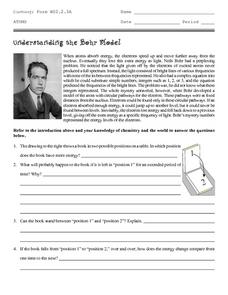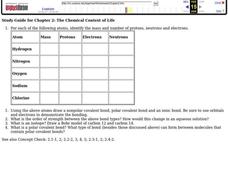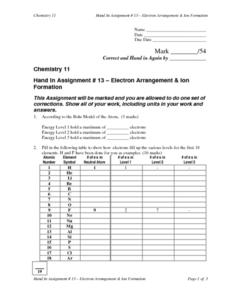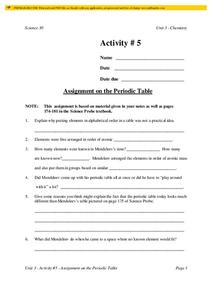Curated OER
The Bohr Model vs. the Wave Mechanical Model
In this Bohr model and wave mechanical model worksheet, students read about the differences between these two models of the atom. Students answer four questions about these models.
Curated OER
Understanding the Bohr Model
In this Bohr model worksheet, high schoolers read about Neils Bohr and the model he proposed of the atom. Students answer nine questions about his theory that electrons travel in orbitals and give off energy when they are excited.
Shelby County Schools
Atomic Structure Worksheet
Teaching young scientists about atoms is no small task, but this series of worksheets will make it a little easier. From creating and labeling Bohr models, to identifying information provided in the periodic table of elements,...
Curated OER
Chemistry - Science 10
In this chemistry science worksheet, students identify the parts of a chemical reactions. Students name the major particles of the atom. Students apply knowledge about the atom, theories, and models.
Curated OER
Honors Chemistry I
In this honor chemistry I worksheet, students use all available resources to answer each question given. Students apply their knowledge of light, quantum theory of light, Bohr's model, photoelectric theory.
Curated OER
Location of Electrons
In this location of electrons worksheet, high schoolers read about the quantum mechanical model of the atom and the location of electrons. They complete a table given eleven elements with the sublevel notation, the Bohr notation and the...
T. Trimpe
Atomic Basics
Get down to basics with these worksheets on the structure of atoms. Challenging young chemists to identify information from the periodic table and create Bohr diagrams and Lewis dot structures for different elements, this...
Curated OER
An Electron's Address
Where does an electron reside? Chemistry scholars determine an electron's "address," that is, what orbital it can be found in. This resource is both instructional and practical, providing a thorough explanation of energy levels and...
National Institute of Open Schooling
Atomic Structure
Learners explain historical findings such as Rutherford and Bohr's contributions, explain wave particle duality, and formulate Heinsenberg's uncertainty principle. They also draw s, p, and d orbitals, explain more historical findings,...
It's About Time
The Chemical Behavior of Atoms
Assist your class with this colorful activity as students view and interpret changes in the hydrogen atom. They discuss concepts of the electromagnetic spectrum and use Bohr's model to predict wavelengths and light patterns,...
Curated OER
The Chemical Context of Life
In this chemistry worksheet, students fill in the chart for question one. The chart is filled out examining the mass, protons, electrons, and neutrons for specific atoms.
Curated OER
Review for Chemistry
In this review for chemistry worksheet, students decide if given statements are true or false. Students relate information learned about introductory knowledge gained in chemistry to accurately answer the given questions.
Curated OER
Electron Arrangement and Ion Formation
In this elements worksheet, learners determine how electrons fill up the energy levels for the first 18 elements of the periodic table. Students determine if elements gain or lose electrons to form a stable ion. This worksheet has 4...
Curated OER
Periodic Table
In this periodic table worksheet, students determine why the periodic table is organized the way it is and compare and contrast the characteristics of the different grouping of elements. This worksheet has 22 short answer and 36 fill in...
It's About Time
Atoms with More Than One Electron
Provide young chemists with the ability to manipulate atoms and predict their results, in this sixth lesson. Pupils analyze energy patterns as they predict the amount of energy required to remove electrons from atoms. They compare trends...
Curated OER
Worksheet 4-1 Atomic Spectra
In this atomic spectra worksheet, learners answer eighteen questions about wavelengths of light, the emission spectrum, energy of photons, the frequency of electromagnetic radiation and electrons in the excited state.

















